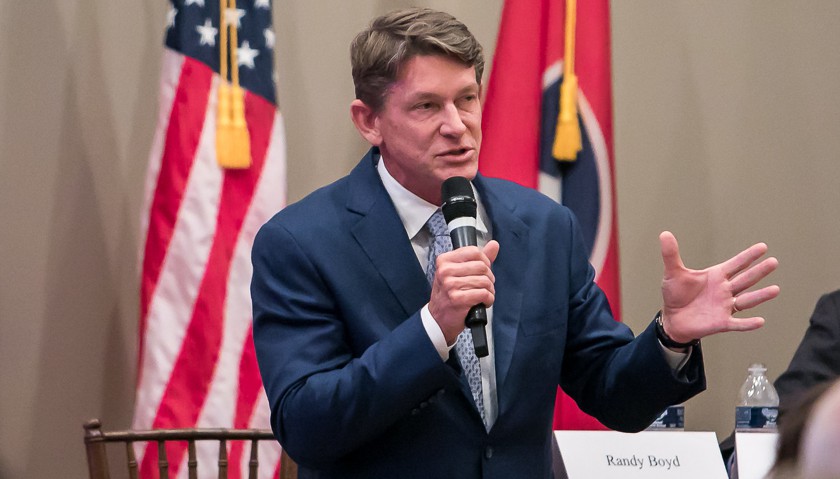Tax incentives to attract and retain businesses in Tennessee can be a good thing for the state, gubernatorial candidate Randy Boyd told the Beacon Center of Tennessee on Tuesday.
“You’ve got to make smart decisions, but if you make the smart decision, you can get a good return on investment,” Boyd said.
![]() The Beacon Center has been conducting Facebook Live interviews of the candidates in the 2018 race for governor. Questions have centered around issues facing the state that are of particular interest to the Beacon Center, a Nashville-based think tank that promotes the free market.
The Beacon Center has been conducting Facebook Live interviews of the candidates in the 2018 race for governor. Questions have centered around issues facing the state that are of particular interest to the Beacon Center, a Nashville-based think tank that promotes the free market.
The Beacon Center is against so-called corporate welfare and has produced a short documentary on the topic called Rigged: The Injustice of Corporate Welfare. The center maintains that tax incentives offered to large companies hurt small businesses and put government in the position of picking winners and losers.
In his comments about business tax credits, Boyd offered a contrast with state House Speaker Beth Harwell (R-Nashville), Williamson County businessman Bill Lee and former state Sen. Mae Beavers, who were interviewed earlier. Harwell and Beavers were resolute in their agreement with the Beacon Center about corporate welfare, while Lee said there needs to be more transparency in the process and a balance that includes small businesses.
Boyd, a Knoxville businessman who left his job as Gov. Haslam’s economic development commissioner to run for governor, said the key is to look at which incentives are efficient and which are not. Boyd differentiated what he supports with the phrase corporate welfare, saying, “I’m not in favor of corporate welfare. We’re not going to be writing checks that go to the companies’ bottom lines.”
In 2015, the Haslam administration proposed taking 10 tax credits off the books and they were, Boyd said. The next year, the administration brought in a consulting firm to review all the tax incentives and evaluate their effectiveness.
Boyd mentioned the state’s FastTrack funds, which help with job training for Tennesseans and with public infrastructure. The program requires companies to prove they have done the work before receiving funds.
The state’s investment has to be considered in light of how much in taxes a company will pay over a given period of time, he said.
“Last year our return on investment was 46 percent,” he said, adding that tax incentives over the past two years have helped with the creation of 50,000 new jobs.
Many people don’t realize that 77 percent of tax incentives go to businesses already in Tennessee, Boyd said.
Boyd is an entrepreneur who is the founder and chairman of Radio Systems Corporation, which makes pet products under brand names including Invisible Fence, PetSafe and SportDOG. Started out of the back of Boyd’s van, the company today has more than 700 employees in seven countries and annual revenues of $400 million.
He told the Beacon Center he wants to help small businesses by reducing licensing requirements and slashing regulations. He has made helping entrepreneurs one of the centerpieces of his campaign.
Boyd also served as an adviser to Haslam on higher education and was instrumental in developing Drive to 55, a push to incentivize at least 55 percent of Tennesseans to have some type of education past high school by 2025. At the end of last year, the state was only at 39 percent.
“We’ve got a long ways to go,” said Boyd, emphasizing that greater strides need to be made especially with promoting technical education.
Boyd this week released a 10-point plan to address the opioid epidemic in the state. He told the Beacon Center that in talking to police chiefs and sheriffs across the state, he has learned about prison overcrowding. The percentage of people in jail who have problems with addiction or mental illness ranges from 20 to 70 percent, he said. Boyd said the state needs to do more to invest in places where people can get treatment.
Here is the video of the Beacon Center interview:








